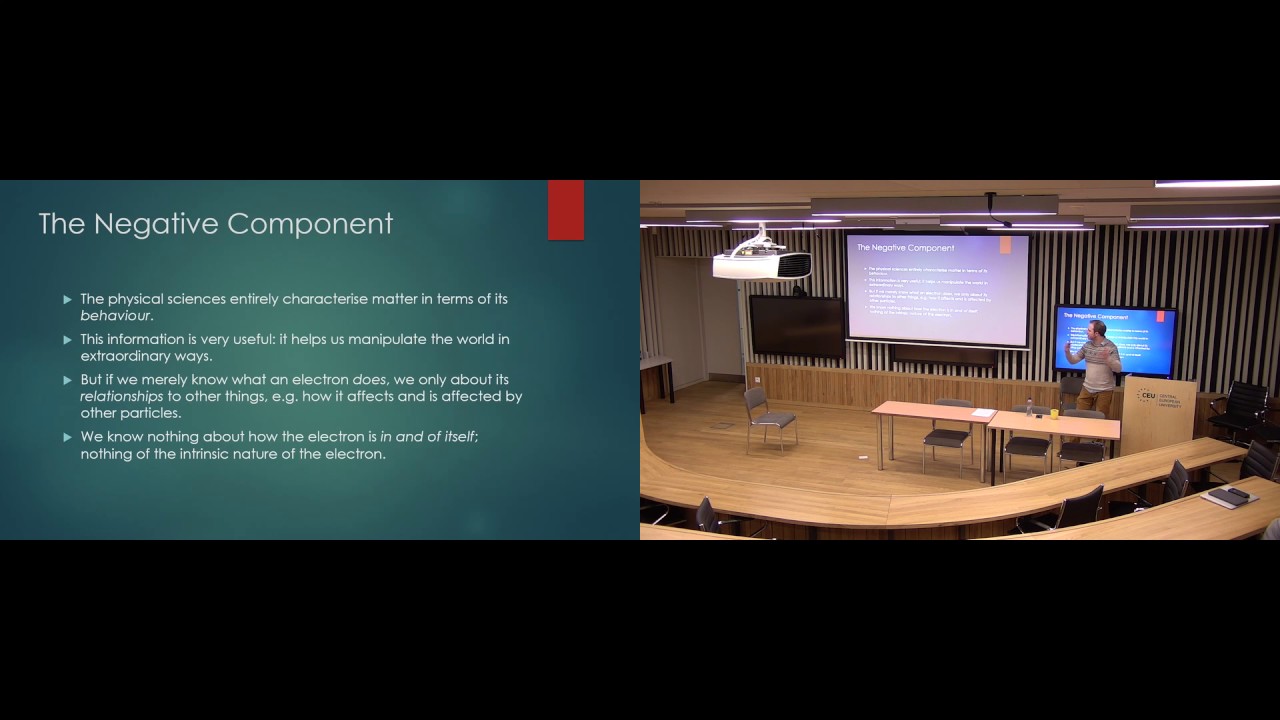Philip Goff
In The Analysis of Matter (1927) Bertrand Russell defended a couple of theses that amounted to a novel approach to the mind-body problem. Similar claims were defended by Eddington in his Gifford lectures of the same year. This approach was forgotten about in the latter half of the twentieth century, perhaps because it didn’t fit with the physicalist predilections of the period. However, it has recently been rediscovered, leading to a view – or better a school of views – known as ‘Russellian monism.’ Russellian monism is increasingly seen as a promising middle way between dualism and physicalism, avoiding the problems associated with either of these extremes. In this lecture, I explain the basic idea.
Source
Russellian Monism A Solution to the Hard Problem of Consciousness



Interesting. I'm not sure I accept Russell's version of structuralism and intrinsic natures though. Yes, physics down tell us dispositions of entities, but it also tells us about spatiality of those entities. Spatiality is part of a thing's intrinsic nature too. So there is no physical structuralism without some apprehension of intrinsicality.
Consciousness requires relationship (intentionality), and seems to be holographic in nature. A single particle has nothing to be conscious of. At least two particles are needed (the same holds true in a continuum theory of particles). Physics tells us ([1] and [2]) that the difference between radiation and matter is a trembling component to the momentum density of the latter but not the former. Modern physics doesn't explain what holds the electron together. Naturally, it should self-repell, but something (Poincaré stresses) keeps it together (this is an ultra-strong force stronger than the strong force which holds the nucleus together, but is unfortunately ignored in physics since about a 100 years). This seems to suggest that matter particles are consequences of the presence of other matter particles (Mach's principle) which account for the Poincaré stresses (but the Casimir force has been ruled out). Again, matter seems to be relational, just like consciousness. My speculation is that everything is "other-conscious", while "self-consciousness" is a feedback mechanism in our brains which make us think about our thought (this is the biblical fall of man, where "other-consciousness" was polluted). The issue is how memories are stored, not only in the brain, but in nature. Without memory there is no experience bank from which inputs can be compared and be grasped. Memories are ultimately associated with causal events in the past, i.e. the past light-cone. Somehow, the consciousness "here and now" depends on the entire past light-cone, in a similar way to how the electromagnetic 4-potential also depends on the electromagnetic field in the past light-cone. Memory in nature is thus intimately tied to the 4-potential, and perhaps also consciousness, albeit indirectly.
[1] "Zitterbewegung" from the solution of the Dirac equation.
[2] Extended Maxwell's equations by Dr. John G. Williamson.
Russell was good mathematician but a bad philosopher.
This was very helpful to supplement my class. I was disappointed you didn’t have many more videos!
I like Consciousness. I want to be more aware of it and learn from it but so paradoxical in nature :/
Theres an argument to be made that subjective experience includes ONLY consciousness. Try long enough to find the boundary between a sight and your awareness of it. The field of vision IS colors, not objects spitting colors at me. It is made of color. Then the next step is find the difference between the color and my seeing of it and my awareness of the sight of it. There is no difference, just raw color/consciousness. Again not consciousness OF color. Just colorness/awareness. All attempts to find the boundary between the color and my awareness of it will end in a recognition that I am mentally superimposing this boundary via imagination. It’s not there. Seeing light is lightness/awareness, not awareness of seeing light, not even awareness of light. Just light. Just awareness. It is MADE of awareness. Same with thoughts and feeling (sensations) and other perceptions. It is all MADE of consciousness.
Absoloute saviour, thanks
Why use confusing conceptions like Panpsychism when you have the beautiful clarity and parsimony of Russellian Monism? The beauty of RM is that it renders terms like “mental” and “material” defunct. Good riddance. Let the ontology have the unity we should have recognized from the very beginning.
great talk. thank you!
How would, the knowledge that the firing of certain neurons causes pain, be expressed outwardly, if the neurons are firing weather they intrinsically feel pain or not.
https://www.youtube.com/watch?v=Jb5nEVGK0Fg&t=2769s
Neutral Monism – This is the most promising BASIS for continuing on in this field.
1. Doesn't rely on panpsychism at all
2. Doesn't rely on Idealism at all
3. Reflects actual experience of all of us
4. is based on relationships alone. That is, the intrinsic nature OF nature IS relationship.
I really like Russellian Monism. But there are a couple of things that prevent me from endorsing it; the problem of combination and the problem of mental causation.
It seems to me that the intrinsic nature of a complex entity is exhausted by its structure. In other words, if I know the constituents of a complex entity and their behaviors and relationships, nothing would be left out about its intrinsic nature. This is not true of simples (space, time and fundamental particles). It seems quite intuitive to suppose that simples have an intrinsic categorical nature that grounds their dispositions. Our brains are complex and thus do not seem to possess an intrinsic nature extra to their structures.
The other problem comes from the possibility of zombies and shuffled qualia. If zombies are possible, then it would mean that our behavior could also be grounded in any intrinsic nature other than consciousness. On the other hand, the same conscious state can conceivably ground different behaviors. My pain could be your itch. So the very same quale of pain can correspond to different behaviors in two people. This makes consciousness unnecessary and insufficient for behavior production and thus epiphenomenal. In other words, unless we can provide a necessary link between the intrinsic nature of our brain states and their causal powers, we would end up with epiphenomenalism.
I agree with a lot of this strongly up until it gets to panpsychism – which I'm not necessarily against but I think it has some particular weaknesses, particularly matching human experience. I look, for example, at what comes of people really playing with their subjective experiences over decades in traditional settings for that sort of thing as well as the accounts of NDE's and it seems more like what we're dealing with is functionalism with multiple realizability – ie. that having one's 'I' experience leak out or project itself into or onto something else is one of the more common mystical experience claims. There is, for example, another terminology for Ned Block's China Brain – they've been known for a long time in such groups as egregores. I get that the appearances issue, such as the craziness question of whether electrons can be conscious, would apply here even more so but I'd have to hope that – just like the giggles are wearing off a bit on thinking electrons – that people might also ask the question of whether ridiculousness of a China brain might only be a problem when it's considered at the wrong order of intensity.